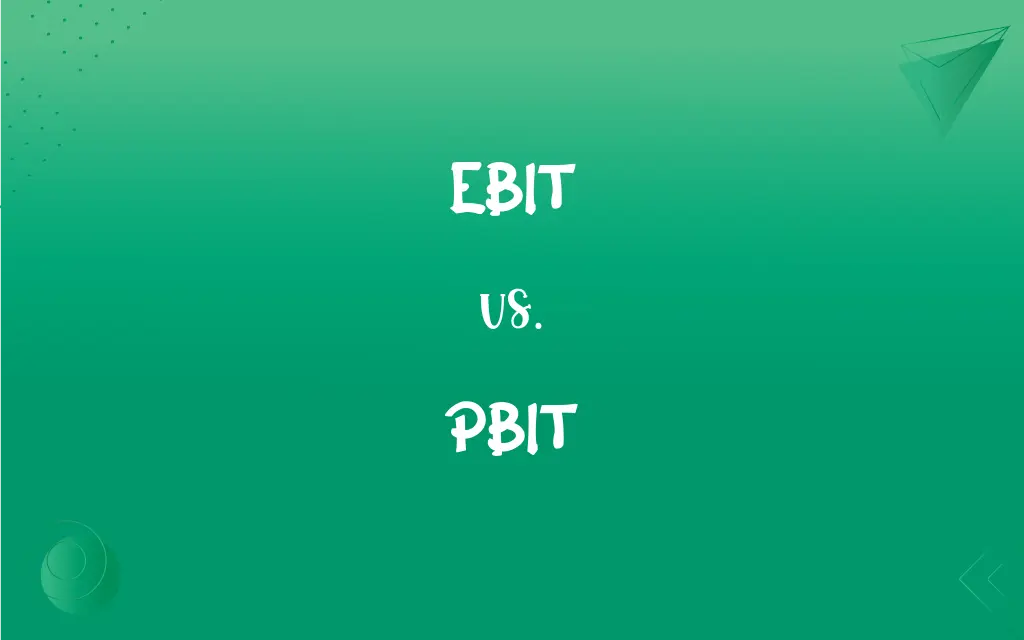EBIT vs. PBIT: What's the Difference?
Edited by Aimie Carlson || By Janet White || Published on February 6, 2024
EBIT (Earnings Before Interest and Taxes) measures a company's profitability excluding interest and taxes, while PBIT (Profit Before Interest and Taxes) is essentially the same metric, just under a different name.

Key Differences
EBIT, or Earnings Before Interest and Taxes, is a financial metric that calculates a company's profit excluding interest and tax expenses. PBIT, standing for Profit Before Interest and Taxes, is another term for the same concept, emphasizing the profit aspect.
Both EBIT and PBIT are used to assess a company's operational efficiency without the impact of financial and tax structuring. This allows for a clearer comparison of performance across different tax environments and capital structures.
In financial analysis, EBIT or PBIT is often considered to understand the core operational performance of a business. They both exclude expenses that are considered external to the company's core operations, like interest and taxes.
EBIT is a more commonly used term in financial reporting, while PBIT is also used and understood in the same context. The choice between the terms can be a matter of preference or regional usage.
Investors and analysts use EBIT or PBIT to evaluate a company's potential for profitability, independent of its leverage and tax obligations. Both provide a level playing field for comparing companies in different industries.
ADVERTISEMENT
Comparison Chart
Full Form
Earnings Before Interest and Taxes
Profit Before Interest and Taxes
Focus
Measures operational profitability
Same as EBIT, focuses on operational profit
Exclusions
Excludes interest and taxes from profit calculation
Same as EBIT, excludes interest and taxes
Common Usage
More prevalent in international financial reporting
Often used interchangeably with EBIT
Relevance in Analysis
Used to evaluate company performance sans financial structure
Identical use in analyzing core business efficiency
ADVERTISEMENT
EBIT and PBIT Definitions
EBIT
A financial metric showing a company's profitability before interest and taxes.
The company's EBIT increased this year, indicating improved operational efficiency.
PBIT
A tool for assessing a firm's earnings power before financial costs and taxes.
The company's strong PBIT suggests efficient operational performance.
EBIT
A tool for comparing companies' profitability without tax and interest impact.
Investors compared the EBIT of different firms to find the best investment.
PBIT
An indicator of operational profit, excluding financial and tax obligations.
By analyzing PBIT, we can gauge the company's core profitability.
EBIT
An indicator of business profitability without considering debt or tax expenses.
Despite high interest expenses, the firm's EBIT remained strong.
PBIT
A gauge of earnings from core business activities, free from external factors.
PBIT reveals the true earning potential of the company's operations.
EBIT
A measure of a firm's earnings with financial and tax costs excluded.
Analysts focus on EBIT to understand the company's true business performance.
PBIT
A measure of a company's profitability before accounting for interest and taxes.
Their PBIT has shown consistent growth, reflecting solid operational management.
EBIT
A gauge of operational earnings without external financial influences.
EBIT provides a clear picture of the company's operational success.
PBIT
A financial metric to compare business efficiency across different tax regimes.
Comparing PBIT helps in evaluating companies irrespective of their debt levels.
EBIT
An entangled bit (in a quantum computer)
FAQs
What does EBIT stand for?
EBIT stands for Earnings Before Interest and Taxes.
Is PBIT the same as EBIT?
Yes, PBIT and EBIT are essentially the same, with PBIT emphasizing the 'profit' aspect.
Can EBIT be negative?
Yes, if a company's operational costs exceed its revenues, EBIT can be negative.
How do you calculate EBIT?
EBIT is calculated by subtracting operating expenses from revenues, before accounting for interest and taxes.
Is PBIT a good indicator of cash flow?
PBIT is an indicator of profitability, not cash flow, as it includes non-cash expenses like depreciation.
What's the difference between EBIT and net income?
Net income is calculated after subtracting interest and taxes from EBIT.
Do all companies report PBIT?
Not all companies explicitly report PBIT, but it can be calculated from available financial data.
Why is EBIT important in financial analysis?
EBIT is important because it provides a clear view of a company's operational efficiency, excluding financial and tax impacts.
What does PBIT indicate about a company?
PBIT indicates the profitability of a company's core operations before considering interest and taxes.
Does EBIT include depreciation and amortization?
Yes, EBIT includes depreciation and amortization expenses.
Why might PBIT be preferred over net income for analysis?
PBIT is preferred when assessing operational efficiency, as it excludes financial structuring effects.
How does EBIT differ from EBITDA?
EBITDA excludes depreciation and amortization from EBIT calculation.
How does EBIT help in comparing companies?
EBIT allows for comparison of companies by neutralizing the effects of financing and tax strategies.
Can EBIT predict future profitability?
EBIT can provide insights but is not a guaranteed predictor of future profitability.
Is PBIT affected by accounting policies?
PBIT can be influenced by how a company handles its operating expenses in accounting.
Is PBIT used in all financial statements?
PBIT is not a mandatory line item but is commonly used in financial analysis.
Can EBIT be used for all types of businesses?
Yes, EBIT is a versatile metric applicable to businesses across various industries.
Is EBIT impacted by company size?
EBIT focuses on operational efficiency, so it's relevant regardless of company size.
How often is PBIT reported?
PBIT is typically reported in quarterly and annual financial statements.
Can PBIT be used for tax planning?
PBIT provides insight into operational profits but is less directly related to tax planning.
About Author
Written by
Janet WhiteJanet White has been an esteemed writer and blogger for Difference Wiki. Holding a Master's degree in Science and Medical Journalism from the prestigious Boston University, she has consistently demonstrated her expertise and passion for her field. When she's not immersed in her work, Janet relishes her time exercising, delving into a good book, and cherishing moments with friends and family.
Edited by
Aimie CarlsonAimie Carlson, holding a master's degree in English literature, is a fervent English language enthusiast. She lends her writing talents to Difference Wiki, a prominent website that specializes in comparisons, offering readers insightful analyses that both captivate and inform.































































